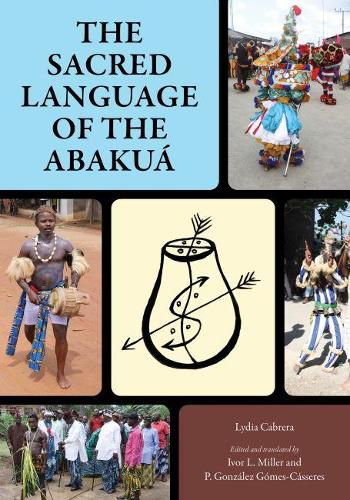Readings Newsletter
Become a Readings Member to make your shopping experience even easier.
Sign in or sign up for free!
You’re not far away from qualifying for FREE standard shipping within Australia
You’ve qualified for FREE standard shipping within Australia
The cart is loading…






This title is printed to order. This book may have been self-published. If so, we cannot guarantee the quality of the content. In the main most books will have gone through the editing process however some may not. We therefore suggest that you be aware of this before ordering this book. If in doubt check either the author or publisher’s details as we are unable to accept any returns unless they are faulty. Please contact us if you have any questions.
In 1988, Lydia Cabrera (1899-1991) published La lengua sagrada de los Nanigos, an Abakua phrasebook that is to this day the largest work available on any African diaspora community in the Americas. In the early 1800s in Cuba, enslaved Africans from the Cross River region of southeastern Nigeria and southwestern Cameroon created Abakua societies for protection and mutual aid. Abakua rites reenact mythic legends of the institution’s history in Africa, using dance, chants, drumming, symbolic writing, herbs, domestic animals, and masked performers to represent African ancestors. Criminalized and scorned in the colonial era, Abakua members were at the same time contributing to the creation of a unique Cuban culture, including rumba music, now considered a national treasure. Translated for the first time into English, Cabrera’s lexicon documents phrases vital to the creation of a specific African-derived identity in Cuba and presents the first insider’s view of this African heritage. This text presents thoroughly researched commentaries that link hundreds of entries to the context of mythic rites, skilled ritual performance, and the influence of Abakua in Cuban society and popular music. Generously illustrated with photographs and drawings, the volume includes a new introduction to Cabrera’s writing as well as appendices that situate this important work in Cuba’s history.
With the help of living Abakua specialists in Cuba and the US, Ivor L. Miller and P. Gonzalez Gomes-Casseres have translated Cabrera’s Spanish into English for the first time while keeping her meanings and cultivated style intact, opening this seminal work to new audiences and propelling its legacy in African diaspora studies.
$9.00 standard shipping within Australia
FREE standard shipping within Australia for orders over $100.00
Express & International shipping calculated at checkout
This title is printed to order. This book may have been self-published. If so, we cannot guarantee the quality of the content. In the main most books will have gone through the editing process however some may not. We therefore suggest that you be aware of this before ordering this book. If in doubt check either the author or publisher’s details as we are unable to accept any returns unless they are faulty. Please contact us if you have any questions.
In 1988, Lydia Cabrera (1899-1991) published La lengua sagrada de los Nanigos, an Abakua phrasebook that is to this day the largest work available on any African diaspora community in the Americas. In the early 1800s in Cuba, enslaved Africans from the Cross River region of southeastern Nigeria and southwestern Cameroon created Abakua societies for protection and mutual aid. Abakua rites reenact mythic legends of the institution’s history in Africa, using dance, chants, drumming, symbolic writing, herbs, domestic animals, and masked performers to represent African ancestors. Criminalized and scorned in the colonial era, Abakua members were at the same time contributing to the creation of a unique Cuban culture, including rumba music, now considered a national treasure. Translated for the first time into English, Cabrera’s lexicon documents phrases vital to the creation of a specific African-derived identity in Cuba and presents the first insider’s view of this African heritage. This text presents thoroughly researched commentaries that link hundreds of entries to the context of mythic rites, skilled ritual performance, and the influence of Abakua in Cuban society and popular music. Generously illustrated with photographs and drawings, the volume includes a new introduction to Cabrera’s writing as well as appendices that situate this important work in Cuba’s history.
With the help of living Abakua specialists in Cuba and the US, Ivor L. Miller and P. Gonzalez Gomes-Casseres have translated Cabrera’s Spanish into English for the first time while keeping her meanings and cultivated style intact, opening this seminal work to new audiences and propelling its legacy in African diaspora studies.